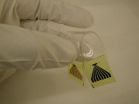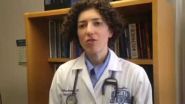(Press-News.org) Overweight and obese people who feel their physicians are judgmental of their size are more likely to try to shed pounds but are less likely to succeed, according to results of a study by Johns Hopkins researchers.
The findings, reported online last week in the journal Preventive Medicine, suggest that primary care doctors should lose the negative attitudes their patients can sense if the goal is to get patients with obesity to lose 10 percent or more of their body weight — an amount typically large enough to reduce blood pressure, cholesterol and diabetes risk.
"Negative encounters can prompt a weight loss attempt, but our study shows they do not translate into success," says study leader Kimberly A. Gudzune, M.D., M.P.H., an assistant professor in the Division of General Internal Medicine at the Johns Hopkins University School of Medicine. "Ideally, we need to talk about weight loss without making patients feel they are being judged. It's a fine line to walk, but if we can do it with sensitivity, a lot of patients would benefit."
The U.S. Preventive Services Task Force has recommended that health care providers counsel obese patients to lose weight, and the Centers for Medicare and Medicaid Services now covers some behavioral counseling related to weight loss. But Gudzune and her team suspected the pervasiveness of negative provider attitudes and weight stigma may be limiting the effectiveness of advice from primary care providers for these patients.
To test that idea, the researchers conducted a national Internet-based survey of 600 adults with a body mass index of 25 or more who regularly see their primary care doctors. The participants were asked, "In the last 12 months, did you ever feel that this doctor judged you because of your weight?" Twenty one percent of participants said they believed they had been.
Further, 96 percent of those who felt judged did report attempting to lose weight in the previous year, compared to 84 percent who did not. But only 14 percent of those who felt judged and who also discussed weight loss with their doctor lost 10 percent or more of their body weight, while 20 percent who did not feel judged and also discussed shedding pounds lost a similar amount.
Having a weight loss conversation clearly helped people lose more weight, the study found. Only 9 percent of those who felt judged but did not discuss weight loss with their doctor lost more than 10 percent of their body weight, while 6 percent of those who neither felt judged nor discussed weight loss with their doctor did.
Overall, just two-thirds of participants reported that their doctors brought up weight loss.
"Many doctors avoid the conversation because they don't want to make anyone feel bad, worrying they'll create a rift with their patients if they even bring it up. But that is not in the patients' best interest in terms of their long-term health," Gudzune says.
Gudzune, whose own practice focuses on obesity, says that doctors may need to be taught how to talk about the topic in ways that make patients feel understood and supported.
She says it is also helpful to start with smaller weight loss steps, such as a 10 percent reduction in weight. A larger long-term goal of, say, losing 70 or 100 pounds can be a setup for frustration and failure when tackled all at once.
"We don't want to overwhelm them," she says. "If we are their advocates in this process — and not their critics — we can really help patients to be healthier through weight loss."
INFORMATION:
Other Johns Hopkins researchers who contributed to this study include Wendy L. Bennett, M.D., M.P.H.; Lisa A. Cooper, M.D., M.P.H.; and Sara N. Bleich, Ph.D.
The research was supported by trainee awards from the National Institutes of Health's National Heart, Lung and Blood Institute's (NHLBI) Center for Population Health and Health Disparities (P50HL0105187), as well as by other NHLBI grants (K23HL116601, K23HL098476, K24HL083113 and K01HL096409).
For more information:
http://www.hopkinsmedicine.org/gim/faculty/Gudzune.html
http://www.hopkinsmedicine.org/news/media/releases/study_physicians_less_likely_to_bond_with_overweight_patients
http://www.hopkinsmedicine.org/news/media/releases/doctor_shopping_by_obese_patients_negatively_affects_health
Obese patients who feel judged by doctors are less likely to shed pounds, study shows
2014-02-18
ELSE PRESS RELEASES FROM THIS DATE:
Medicaid's 'tube-tying' polices create roadblocks for low-income women
2014-02-18
PRINCETON, N.J.—Tubal ligation – commonly referred to as having one's "tubes tied" – is widely used to prevent unintended pregnancies. However, current Medicaid policies create roadblocks for low-income women trying to obtain the procedure, according to a review written by researchers at Princeton University's Woodrow Wilson School and other U.S. institutions.
Under a Medicaid rule enacted in 1978, women must currently wait 30 days after signing a written consent form to obtain a tubal ligation. This requirement is prohibitive for many women who want to receive the ...
Can marijuana protect the immune system against HIV and slow disease progression?
2014-02-18
New Rochelle, NY, February 18, 2014—New evidence that chronic intake of THC, the primary psychoactive ingredient in marijuana, can protect critical immune tissue in the gut from the damaging effects of HIV infection is reported in AIDS Research and Human Retroviruses, a peer-reviewed journal from Mary Ann Liebert, Inc., publishers. The article is available free on the AIDS Research and Human Retroviruses website at http://www.liebertpub.com/aid.
Patricia Molina and coauthors from Louisiana State University Health Sciences Center, New Orleans, report that chronic THC administration ...
Solar-induced hybrid fuel cell produces electricity directly from biomass
2014-02-18
Although low temperature fuel cells powered by methanol or hydrogen have been well studied, existing low temperature fuel cell technologies cannot directly use biomass as a fuel because of the lack of an effective catalyst system for polymeric materials.
Now, researchers at the Georgia Institute of Technology have developed a new type of low-temperature fuel cell that directly converts biomass to electricity with assistance from a catalyst activated by solar or thermal energy. The hybrid fuel cell can use a wide variety of biomass sources, including starch, cellulose, ...
Quest for jellyfish robot leads to discovery of bending rules for animal wing, fin tips
2014-02-18
WOODS HOLE, Mass. —A Navy-sponsored project to design a biologically inspired, swimming jellyfish robot has led scientists to the surprising discovery of common bending rules for the tips of wings, fins, flukes, mollusk feet, and other propulsors across a broad range of animal species.
The study, led by John H. Costello of Providence College and the Marine Biological Laboratory (MBL) in Woods Hole, where he is a visiting scientist, is published this week in Nature Communications.
By studying videos of 59 different animals—from fruit flies to humpback whales—propelling ...
Single chip device to provide real-time 3-D images from inside the heart, blood vessels
2014-02-18
Researchers have developed the technology for a catheter-based device that would provide forward-looking, real-time, three-dimensional imaging from inside the heart, coronary arteries and peripheral blood vessels. With its volumetric imaging, the new device could better guide surgeons working in the heart, and potentially allow more of patients' clogged arteries to be cleared without major surgery.
The device integrates ultrasound transducers with processing electronics on a single 1.4 millimeter silicon chip. On-chip processing of signals allows data from more than a ...
'Legal highs,' PMMA and zombie panic
2014-02-18
Recent deaths in both Canada and the UK linked to PMA/PMMA in ecstasy pills has brought public scrutiny to this little known drug. With Canadian producing most of the ecstasy in the North American market, this timely paper (Ecstasy, legal highs and designer drug use: A Canadian perspective) published this week in Drug Science Policy and Law looks at trends in ecstasy adulteration, the facts around PMA/PMMA-linked deaths and explores alternatives to the endless banning of new drugs.
It finds:
In 2007, according to the Health Canada Drug Analysis Service, only 3% of seized ...
A stretchable highway for light
2014-02-18
WASHINGTON, Feb. 18, 2014—For futuristic applications like wearable body sensors and robotic skin, researchers need to ferry information along flexible routes. Electronics that bend and stretch have become possible in recent years, but similar work in the field of optics – communicating with light instead of electrons – has lagged behind. Particularly difficult to engineer have been optics that stretch, lengthening when someone wearing body sensors bends to tie their shoe, or when a robotic arm twists through a full range of motion.
Now a team of Belgian researchers reports ...
Georgia Tech study reveals copyright complexities, social norms in online media creation
2014-02-18
In the age of mashups, fan fiction and content sharing, online media creation has spurred new complexities in copyright, effectively turning the legal concept of "fair use" on its ear, according to a new study from Georgia Tech.
Research into fan fiction and other types of remix communities reveals many legal misconceptions persistent among different groups when applying copyrighted work to their own creations. The research also highlights online social norms – independent of actual law – that guide the use of copyrighted works in fan communities.
For the study, Georgia ...
Clemson researchers develop sticky nanoparticles to fight heart disease
2014-02-18
CLEMSON, S.C. — Clemson University researchers have developed nanoparticles that can deliver drugs targeting damaged arteries, a non-invasive method to fight heart disease.
Heart disease is the leading cause of death in the U.S., according to the Centers for Disease Control and Prevention. One of the standard ways to treat clogged and damaged arteries currently is to implant vascular stents, which hold the vessels open and release such drugs as paclitaxel.
The researchers, led by Clemson bioengineering professor Naren Vyavahare, hope their advanced nanoparticles could ...
Transgender patients discriminated against for health care services
2014-02-18
VIDEO:
Discrimination against transgender people -- as many as one million Americans identify themselves as transgender -- should immediately be addressed by the medical establishment, backed by policy change at the...
Click here for more information.
DETROIT – Discrimination against transgender people –as many as one million Americans identify themselves as transgender – should immediately be addressed by the medical establishment, backed by policy change at the national ...





